Dear fellow writers, if you use Spanish, PLEASE have someone check your manuscript!
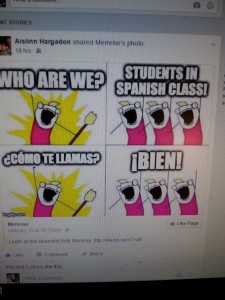 I just saw a post on FB by my dear friend Aislinn, a talented and dedicated Spanish teacher. It was a cartoon of four panels. The teacher asks “Who are we?” Students respond “Students in Spanish class” Teacher asks “Como te llamas?” Students respond “Bien!” NOT the right answer. We can laugh at students, but published Texas authors who should know better, not so much.
I just saw a post on FB by my dear friend Aislinn, a talented and dedicated Spanish teacher. It was a cartoon of four panels. The teacher asks “Who are we?” Students respond “Students in Spanish class” Teacher asks “Como te llamas?” Students respond “Bien!” NOT the right answer. We can laugh at students, but published Texas authors who should know better, not so much.
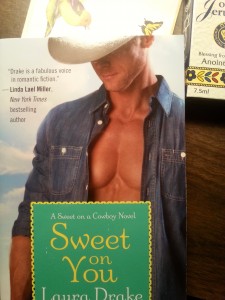 I have truly enjoyed a new author, Laura Drake who writes about cowboys in the Professional Bull Riders Association. In her first book, The Sweet Spot, she focuses on a romance that involves a couple in the PBR rodeo circuit. It is clear that Laura is a Texas girl and knows her stuff, in particular the bull-riding world. It’s always a pleasure to read a book where I can learn something about a field with which I am only vaguely familiar. In addition, it was well written and carefully edited. (This is a photo of her third book which isn’t so bad in spite of the bare chest).
I have truly enjoyed a new author, Laura Drake who writes about cowboys in the Professional Bull Riders Association. In her first book, The Sweet Spot, she focuses on a romance that involves a couple in the PBR rodeo circuit. It is clear that Laura is a Texas girl and knows her stuff, in particular the bull-riding world. It’s always a pleasure to read a book where I can learn something about a field with which I am only vaguely familiar. In addition, it was well written and carefully edited. (This is a photo of her third book which isn’t so bad in spite of the bare chest).
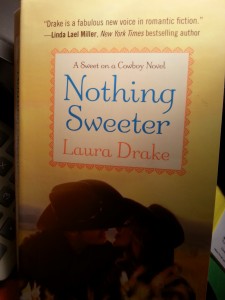 The second book, Nothing Sweeter, was a terrible disappointment. It is chock full of errors, in particular in Spanish. I was crushed! On page 47 she has the cook, a ‘frizzy’ haired Mexican (that’s not likely), tell her heroine to “cut poquito—small.” I nearly cried! Later (p. 55) she uses ‘Lupia’ as the name of a villain who uses Spanish profanity. The only possible Spanish name it could be is ‘Lupita.’ And then on page 93, she has the Mexican cook tell the heroine “today you look like a chica—very pretty!” HUH???? I haven’t been able to finish the book.
The second book, Nothing Sweeter, was a terrible disappointment. It is chock full of errors, in particular in Spanish. I was crushed! On page 47 she has the cook, a ‘frizzy’ haired Mexican (that’s not likely), tell her heroine to “cut poquito—small.” I nearly cried! Later (p. 55) she uses ‘Lupia’ as the name of a villain who uses Spanish profanity. The only possible Spanish name it could be is ‘Lupita.’ And then on page 93, she has the Mexican cook tell the heroine “today you look like a chica—very pretty!” HUH???? I haven’t been able to finish the book.
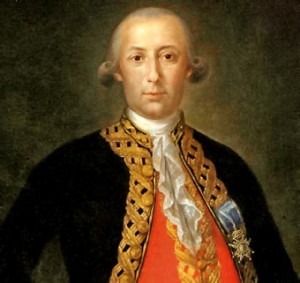 I recently received a magnificent book on Bernardo de Gálvez by the Real Academia de San Telmo in Seville, Spain. It had several sections translated into English. Manolo, my dear friend and the co-author of the book, wrote and apologized for the incorrect translations. Perhaps I am a horrible racist, but I kind of expected a foreigner in Spain to be unable to get the English translations correct.
I recently received a magnificent book on Bernardo de Gálvez by the Real Academia de San Telmo in Seville, Spain. It had several sections translated into English. Manolo, my dear friend and the co-author of the book, wrote and apologized for the incorrect translations. Perhaps I am a horrible racist, but I kind of expected a foreigner in Spain to be unable to get the English translations correct.
I live in terror of having such errors in my first novel (not yet published) on Spanish Texas. It’s not that I don’t speak Spanish. I was born and raised in Mexico, but I have been gone for nearly fifty years and my vocabulary has suffered. Besides, I left Mexico as a 17 year-old and never had the chance to read the great Spanish literature. Hence, my Spanish, as a friend of mine informed me, is “Archaic and from the kitchen!” Too true! I learned my Spanish 60-odd years ago from the maid.
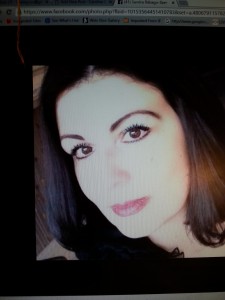 To avoid errors in Spainsh, I have submitted my manuscripts on 18th century New Spain is to several of my Mexican friends for review. My cousin, Sandra, was the first line of defense. I read the manuscript to her in its very early iterations and she made dozens of corrections from character interactions to Spanish terms. She is particularly good at understanding how the Mexicans in the story might have behaved.
To avoid errors in Spainsh, I have submitted my manuscripts on 18th century New Spain is to several of my Mexican friends for review. My cousin, Sandra, was the first line of defense. I read the manuscript to her in its very early iterations and she made dozens of corrections from character interactions to Spanish terms. She is particularly good at understanding how the Mexicans in the story might have behaved.
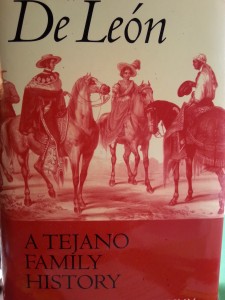 Errors do creep in regardless. In my 2004 non-fiction book De León: A Tejano Family History (see it here) , a San Antonio native who is a Catholic was very upset at my calling the church in San Antonio during the early 1800s a “Cathedral.” She was absolutely correct, Texas did not have a Bishop at the time and a church is only called a Cathedral when it has a bishop.
Errors do creep in regardless. In my 2004 non-fiction book De León: A Tejano Family History (see it here) , a San Antonio native who is a Catholic was very upset at my calling the church in San Antonio during the early 1800s a “Cathedral.” She was absolutely correct, Texas did not have a Bishop at the time and a church is only called a Cathedral when it has a bishop.
Eduardo and Lolita are both scholarly and well-educated friends from Mexico who now live in The Woodlands, just south of me. Lolita and I went to school together in Mexico at the American School from the time we were in Kindergarten until I left Mexico during my Junior year back in 1963. We reconnected through Facebook a few years ago and have had fun being back together.
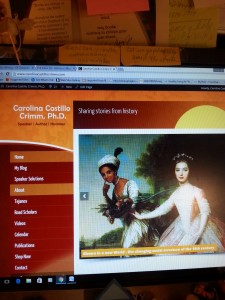 I gave Eduardo and Lolita my first two manuscripts to review. Blessings on such good friends! They flagged dozens of errors, even going to the point of looking up details on bull-fighting to make sure I had gotten it right. I hadn’t, but thanks to them, I made the corrections. That is why it is critical to have good Beta readers review a manuscript before it goes to the agent or, God forbid, to print.
I gave Eduardo and Lolita my first two manuscripts to review. Blessings on such good friends! They flagged dozens of errors, even going to the point of looking up details on bull-fighting to make sure I had gotten it right. I hadn’t, but thanks to them, I made the corrections. That is why it is critical to have good Beta readers review a manuscript before it goes to the agent or, God forbid, to print.
 There is still an on-going debate among my beloved Beta Readers about what the maid would have called our heroine, Analisa. Would she have been ‘niña’ (little girl), or ‘querida’ (dear or beloved), or perhaps the more formal ‘Señorita’ (Miss). Since the book deals with a maid and her mistress during 1772, what is done today might not be accurate for nearly two hundred years ago, but we are trying.
There is still an on-going debate among my beloved Beta Readers about what the maid would have called our heroine, Analisa. Would she have been ‘niña’ (little girl), or ‘querida’ (dear or beloved), or perhaps the more formal ‘Señorita’ (Miss). Since the book deals with a maid and her mistress during 1772, what is done today might not be accurate for nearly two hundred years ago, but we are trying.
One thing I can be sure of, there won’t be any ‘poquito’ or ‘chica’ in The Spanish Captain’s Daughter!

… [Trackback]
[…] Information on that Topic: carolinacastillocrimm.com/writers-using-spanish/ […]
… [Trackback]
[…] Find More Info here to that Topic: carolinacastillocrimm.com/writers-using-spanish/ […]
… [Trackback]
[…] Read More to that Topic: carolinacastillocrimm.com/writers-using-spanish/ […]
… [Trackback]
[…] Find More Information here to that Topic: carolinacastillocrimm.com/writers-using-spanish/ […]
… [Trackback]
[…] Info on that Topic: carolinacastillocrimm.com/writers-using-spanish/ […]
… [Trackback]
[…] Find More Info here to that Topic: carolinacastillocrimm.com/writers-using-spanish/ […]
… [Trackback]
[…] Read More on that Topic: carolinacastillocrimm.com/writers-using-spanish/ […]
… [Trackback]
[…] Find More to that Topic: carolinacastillocrimm.com/writers-using-spanish/ […]
… [Trackback]
[…] Here you will find 58136 more Information to that Topic: carolinacastillocrimm.com/writers-using-spanish/ […]